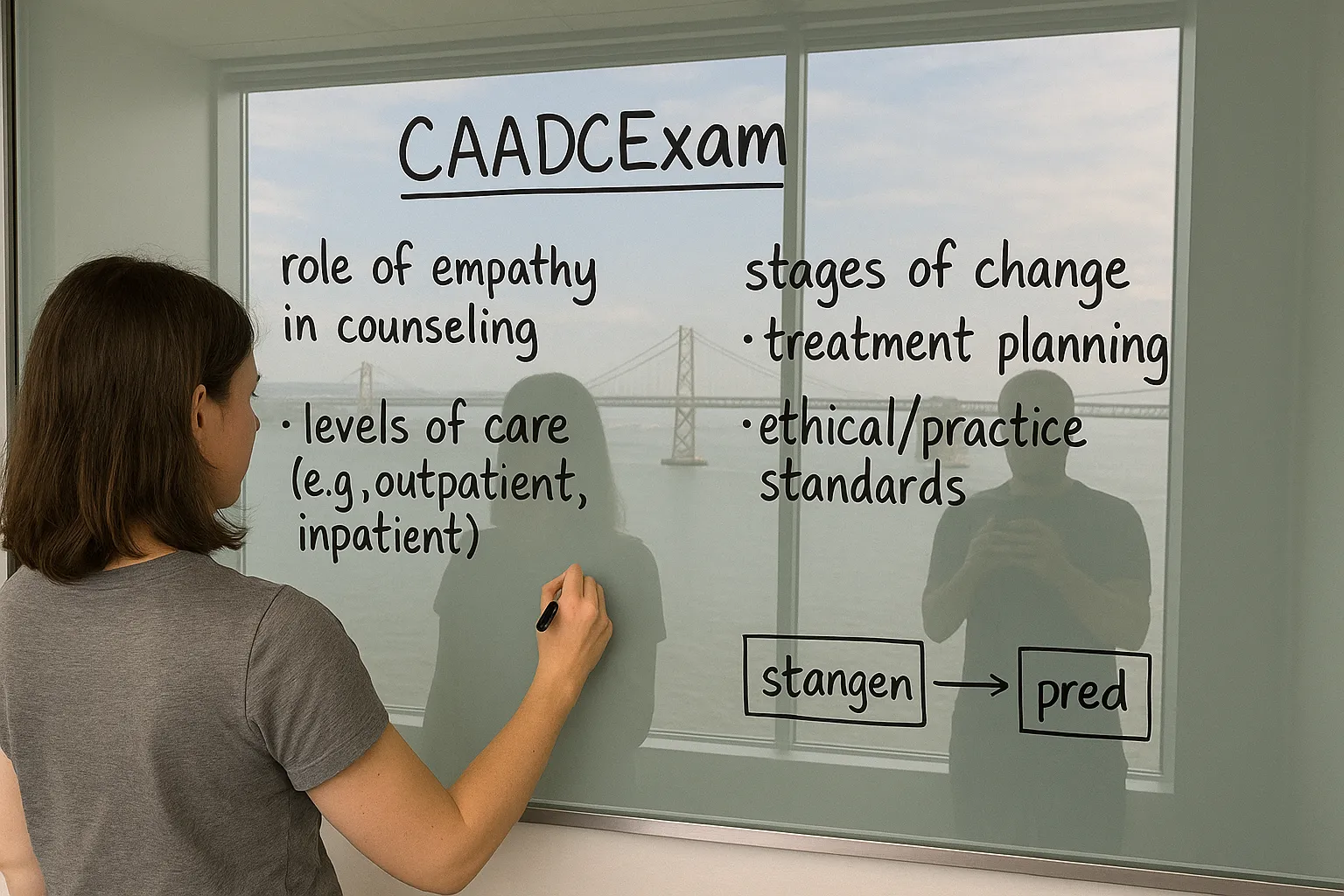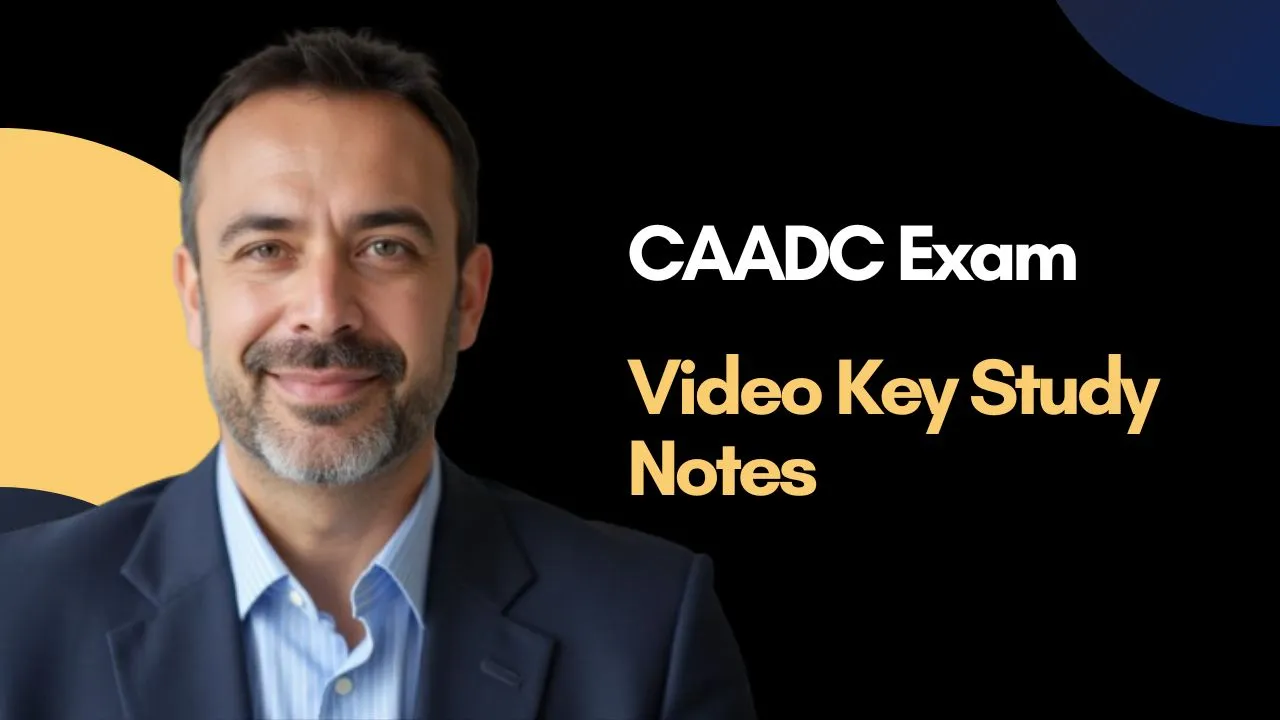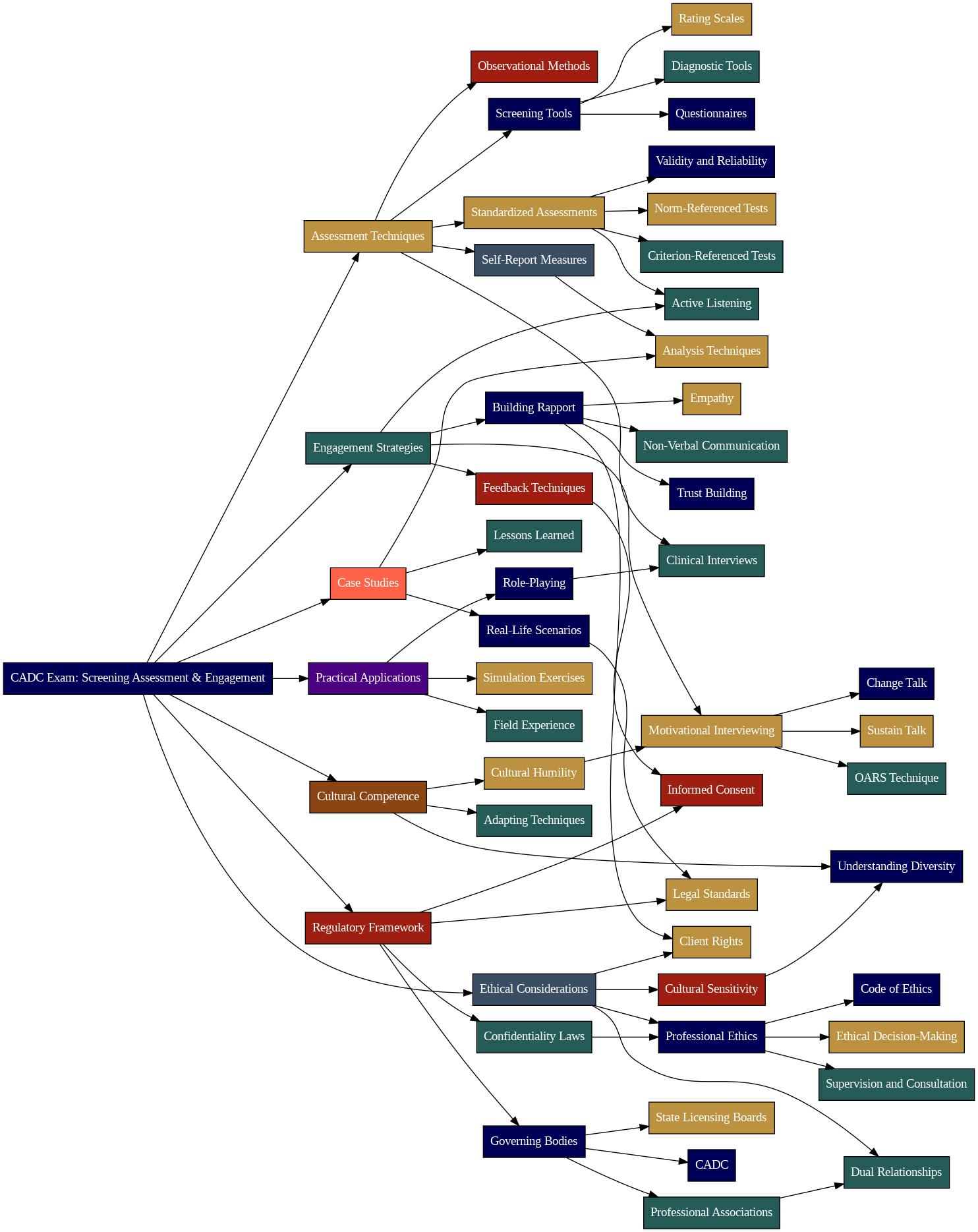Quiz-summary
0 of 27 questions completed
Questions:
- 1
- 2
- 3
- 4
- 5
- 6
- 7
- 8
- 9
- 10
- 11
- 12
- 13
- 14
- 15
- 16
- 17
- 18
- 19
- 20
- 21
- 22
- 23
- 24
- 25
- 26
- 27
Information
Premium Practice Questions
You have already completed the quiz before. Hence you can not start it again.
Quiz is loading...
You must sign in or sign up to start the quiz.
You have to finish following quiz, to start this quiz:
Results
0 of 27 questions answered correctly
Your time:
Time has elapsed
Categories
- Not categorized 0%
- 1
- 2
- 3
- 4
- 5
- 6
- 7
- 8
- 9
- 10
- 11
- 12
- 13
- 14
- 15
- 16
- 17
- 18
- 19
- 20
- 21
- 22
- 23
- 24
- 25
- 26
- 27
- Answered
- Review
-
Question 1 of 27
1. Question
A client, David, presents to a Colorado LAC with symptoms of both substance use disorder and severe depression and anxiety that appear to be independent of his substance use. What is the LAC’s MOST ETHICALLY sound response regarding scope of practice?
Correct
Scope of practice for Licensed Addiction Counselors (LACs) in Colorado is defined by state statutes and regulations, outlining the specific activities and services that LACs are legally permitted to perform. LACs typically provide counseling, assessment, treatment planning, and case management services to individuals with substance use disorders and their families. However, their scope of practice is generally more limited compared to Licensed Professional Counselors (LPCs) or Licensed Clinical Social Workers (LCSWs), particularly regarding the diagnosis and treatment of mental health disorders that are not directly related to substance use. While LACs can address co-occurring mental health issues that are related to or exacerbated by substance use, they are generally not qualified or authorized to provide independent mental health therapy for primary mental health disorders. Attempting to treat conditions outside their scope of practice can be both unethical and illegal. Collaboration with other qualified professionals, such as LPCs or LCSWs, is essential when clients present with complex mental health needs that exceed the LAC’s expertise. In the scenario presented, the client’s symptoms of severe depression and anxiety, which are not solely related to substance use, suggest a need for specialized mental health treatment that falls outside the scope of practice for an LAC. Referring the client to a qualified mental health professional is the most appropriate course of action to ensure they receive the necessary care. Continuing to provide counseling without addressing the underlying mental health issues could be detrimental to the client’s well-being.
Incorrect
Scope of practice for Licensed Addiction Counselors (LACs) in Colorado is defined by state statutes and regulations, outlining the specific activities and services that LACs are legally permitted to perform. LACs typically provide counseling, assessment, treatment planning, and case management services to individuals with substance use disorders and their families. However, their scope of practice is generally more limited compared to Licensed Professional Counselors (LPCs) or Licensed Clinical Social Workers (LCSWs), particularly regarding the diagnosis and treatment of mental health disorders that are not directly related to substance use. While LACs can address co-occurring mental health issues that are related to or exacerbated by substance use, they are generally not qualified or authorized to provide independent mental health therapy for primary mental health disorders. Attempting to treat conditions outside their scope of practice can be both unethical and illegal. Collaboration with other qualified professionals, such as LPCs or LCSWs, is essential when clients present with complex mental health needs that exceed the LAC’s expertise. In the scenario presented, the client’s symptoms of severe depression and anxiety, which are not solely related to substance use, suggest a need for specialized mental health treatment that falls outside the scope of practice for an LAC. Referring the client to a qualified mental health professional is the most appropriate course of action to ensure they receive the necessary care. Continuing to provide counseling without addressing the underlying mental health issues could be detrimental to the client’s well-being.
-
Question 2 of 27
2. Question
A client in Colorado overdoses on opioids and is unresponsive. What is the *most* appropriate immediate action for the counselor or a family member present to take, assuming naloxone is available?
Correct
Crisis and emergency response in addiction requires a coordinated approach involving counselors, first responders, and community resources. Developing crisis response plans is essential for preparing for potential emergencies. Counselors need to understand the role of first responders, such as law enforcement and emergency medical services. Community resources for crisis situations include crisis hotlines, mobile crisis teams, and emergency shelters. Training for counselors in crisis management is crucial for providing effective and safe interventions. Post-crisis recovery and support strategies help individuals cope with the aftermath of a crisis. Evaluating crisis intervention outcomes is important for improving future responses.
Incorrect
Crisis and emergency response in addiction requires a coordinated approach involving counselors, first responders, and community resources. Developing crisis response plans is essential for preparing for potential emergencies. Counselors need to understand the role of first responders, such as law enforcement and emergency medical services. Community resources for crisis situations include crisis hotlines, mobile crisis teams, and emergency shelters. Training for counselors in crisis management is crucial for providing effective and safe interventions. Post-crisis recovery and support strategies help individuals cope with the aftermath of a crisis. Evaluating crisis intervention outcomes is important for improving future responses.
-
Question 3 of 27
3. Question
A Licensed Addiction Counselor (LAC) in Colorado is working with a client, Javier, who is struggling with opioid addiction. During a session, Javier discloses that his sister, who has a 7-year-old child, has been leaving the child unsupervised for extended periods while she goes out to obtain drugs. Javier expresses concern for his niece’s safety but pleads with the counselor not to report this information, citing family loyalty and fear of repercussions. What is the LAC’s ethical and legal obligation in this situation?
Correct
In Colorado, addiction counselors are mandated reporters, meaning they are legally obligated to report suspected child abuse or neglect. This duty supersedes confidentiality in situations where a child’s safety is at risk. The reporting obligation is triggered when the counselor has reasonable cause to believe that a child has been subjected to abuse or neglect. Colorado Revised Statutes (C.R.S.) outline the specific requirements for mandatory reporting, including the types of abuse or neglect that must be reported, the timeframe for reporting, and the penalties for failing to report. The counselor must immediately report their concerns to law enforcement or the Department of Human Services. The counselor’s primary responsibility is to protect the child, even if it means breaching client confidentiality. The ethical decision-making process involves weighing the client’s right to privacy against the child’s right to safety. Consultation with supervisors or legal counsel is advisable in complex cases to ensure compliance with the law and ethical standards. Failing to report suspected child abuse or neglect can result in legal penalties for the counselor. The duty to protect children is a paramount ethical and legal obligation for addiction counselors in Colorado. This responsibility aligns with the broader goal of safeguarding vulnerable populations and promoting their well-being.
Incorrect
In Colorado, addiction counselors are mandated reporters, meaning they are legally obligated to report suspected child abuse or neglect. This duty supersedes confidentiality in situations where a child’s safety is at risk. The reporting obligation is triggered when the counselor has reasonable cause to believe that a child has been subjected to abuse or neglect. Colorado Revised Statutes (C.R.S.) outline the specific requirements for mandatory reporting, including the types of abuse or neglect that must be reported, the timeframe for reporting, and the penalties for failing to report. The counselor must immediately report their concerns to law enforcement or the Department of Human Services. The counselor’s primary responsibility is to protect the child, even if it means breaching client confidentiality. The ethical decision-making process involves weighing the client’s right to privacy against the child’s right to safety. Consultation with supervisors or legal counsel is advisable in complex cases to ensure compliance with the law and ethical standards. Failing to report suspected child abuse or neglect can result in legal penalties for the counselor. The duty to protect children is a paramount ethical and legal obligation for addiction counselors in Colorado. This responsibility aligns with the broader goal of safeguarding vulnerable populations and promoting their well-being.
-
Question 4 of 27
4. Question
Jamal, a client in a group therapy session led by a Colorado LAC, details a plan to inflict serious harm on his partner, who he claims has been physically abusing him. Jamal has a history of impulsive behavior but has never acted violently. According to Colorado law regarding duty to warn and protect, what is the LAC’s MOST appropriate initial course of action?
Correct
In Colorado, a Licensed Addiction Counselor (LAC) encounters a complex ethical dilemma when a client, during a group therapy session, reveals detailed plans to harm their abusive partner. Colorado Revised Statutes § 13-21-117 addresses the duty to warn and protect. This statute mandates that mental health professionals, including LACs, have a duty to take reasonable precautions to protect potential victims when a client presents a serious threat of imminent physical violence against a readily identifiable victim or victims. The duty is triggered when the client communicates a specific threat and the counselor believes, or should believe according to the standards of the profession, that the client poses a credible risk. The LAC must first assess the credibility and imminence of the threat. This involves evaluating the client’s history of violence, the specificity of the plan, and the client’s current mental state. If the threat is deemed credible and imminent, the LAC must take reasonable steps to protect the intended victim. These steps may include notifying the potential victim, notifying law enforcement, or taking other actions reasonably calculated to prevent the harm. The LAC must also document the assessment process and the actions taken. Failing to act when the duty to warn and protect is triggered can result in legal liability and disciplinary action by the Colorado Department of Regulatory Agencies (DORA). The LAC must also consider the confidentiality rights of the client, but the duty to protect overrides these rights when a credible threat of imminent violence exists. Consulting with a supervisor or legal counsel is advisable in such situations to ensure compliance with ethical and legal standards.
Incorrect
In Colorado, a Licensed Addiction Counselor (LAC) encounters a complex ethical dilemma when a client, during a group therapy session, reveals detailed plans to harm their abusive partner. Colorado Revised Statutes § 13-21-117 addresses the duty to warn and protect. This statute mandates that mental health professionals, including LACs, have a duty to take reasonable precautions to protect potential victims when a client presents a serious threat of imminent physical violence against a readily identifiable victim or victims. The duty is triggered when the client communicates a specific threat and the counselor believes, or should believe according to the standards of the profession, that the client poses a credible risk. The LAC must first assess the credibility and imminence of the threat. This involves evaluating the client’s history of violence, the specificity of the plan, and the client’s current mental state. If the threat is deemed credible and imminent, the LAC must take reasonable steps to protect the intended victim. These steps may include notifying the potential victim, notifying law enforcement, or taking other actions reasonably calculated to prevent the harm. The LAC must also document the assessment process and the actions taken. Failing to act when the duty to warn and protect is triggered can result in legal liability and disciplinary action by the Colorado Department of Regulatory Agencies (DORA). The LAC must also consider the confidentiality rights of the client, but the duty to protect overrides these rights when a credible threat of imminent violence exists. Consulting with a supervisor or legal counsel is advisable in such situations to ensure compliance with ethical and legal standards.
-
Question 5 of 27
5. Question
A Colorado LAC, during a session, has a client, Javier, who expresses anger towards his estranged business partner, Benita, stating, “I’m so furious I could explode! She ruined my life, and I feel like she deserves to suffer.” Javier has a history of conflict with Benita but no documented history of violence. Later in the session, Javier clarifies, “I would never actually hurt her, but I fantasize about her losing everything like I did.” According to Colorado’s ethical guidelines and legal requirements concerning duty to warn and protect, what is the MOST appropriate course of action for the LAC?
Correct
In Colorado, the duty to warn and protect, as interpreted through case law and ethical guidelines for Licensed Addiction Counselors (LACs), necessitates a careful balancing act between client confidentiality and the safety of potential victims. If a client expresses a clear and imminent threat of serious bodily harm to a specifically identifiable victim or victims, the counselor has a duty to take reasonable steps to protect those individuals. This duty is not absolute and requires professional judgment, considering the credibility of the threat, the client’s intent, and the immediacy of the danger. Reasonable steps might include, but are not limited to, warning the potential victim(s), notifying law enforcement, or taking other actions necessary to prevent harm. The counselor must document the assessment of the threat, the decision-making process, and the actions taken. It is crucial to distinguish between vague or generalized threats and specific, credible threats. Furthermore, Colorado law provides some immunity for counselors who act in good faith to fulfill their duty to warn and protect. This situation contrasts sharply with scenarios where the threat is not imminent or specific, or where the client’s statements are related to past actions without a clear intent to cause future harm. Counselors should also consult with supervisors or legal counsel when facing such complex ethical dilemmas. The critical element is the presence of a specific, imminent threat of serious bodily harm to an identifiable victim.
Incorrect
In Colorado, the duty to warn and protect, as interpreted through case law and ethical guidelines for Licensed Addiction Counselors (LACs), necessitates a careful balancing act between client confidentiality and the safety of potential victims. If a client expresses a clear and imminent threat of serious bodily harm to a specifically identifiable victim or victims, the counselor has a duty to take reasonable steps to protect those individuals. This duty is not absolute and requires professional judgment, considering the credibility of the threat, the client’s intent, and the immediacy of the danger. Reasonable steps might include, but are not limited to, warning the potential victim(s), notifying law enforcement, or taking other actions necessary to prevent harm. The counselor must document the assessment of the threat, the decision-making process, and the actions taken. It is crucial to distinguish between vague or generalized threats and specific, credible threats. Furthermore, Colorado law provides some immunity for counselors who act in good faith to fulfill their duty to warn and protect. This situation contrasts sharply with scenarios where the threat is not imminent or specific, or where the client’s statements are related to past actions without a clear intent to cause future harm. Counselors should also consult with supervisors or legal counsel when facing such complex ethical dilemmas. The critical element is the presence of a specific, imminent threat of serious bodily harm to an identifiable victim.
-
Question 6 of 27
6. Question
A client, Maria, presents to a Colorado-based Licensed Addiction Counselor (LAC) with a history of heavy alcohol use. The counselor recommends naltrexone to manage cravings and schedules Maria for the first injection. The counselor briefly mentions naltrexone’s effectiveness but does not thoroughly discuss the potential risks of continuing to drink alcohol while on naltrexone, nor does she explore alternative treatment options. Which ethical principle and Colorado-specific regulation is MOST directly violated in this scenario?
Correct
Colorado’s regulations concerning substance use treatment emphasize the importance of informed consent, which extends beyond simply obtaining a signature on a form. It requires a comprehensive discussion that ensures the client understands the nature of the treatment, alternative options, potential risks and benefits, and their right to refuse or withdraw from treatment at any time. In this scenario, the counselor has not adequately explained the potential risks of using naltrexone in conjunction with ongoing alcohol consumption, nor has she explored alternative treatment approaches with the client. The counselor’s primary responsibility is to ensure the client’s safety and well-being, which necessitates a thorough informed consent process. The client’s ability to make an informed decision is compromised without a complete understanding of the treatment plan and its potential consequences. Failing to provide this information violates the ethical principles of autonomy and beneficence, which are central to addiction counseling practice in Colorado. Furthermore, Colorado’s specific regulations regarding medication-assisted treatment (MAT) require detailed documentation of the informed consent process, including the discussion of risks, benefits, and alternatives.
Incorrect
Colorado’s regulations concerning substance use treatment emphasize the importance of informed consent, which extends beyond simply obtaining a signature on a form. It requires a comprehensive discussion that ensures the client understands the nature of the treatment, alternative options, potential risks and benefits, and their right to refuse or withdraw from treatment at any time. In this scenario, the counselor has not adequately explained the potential risks of using naltrexone in conjunction with ongoing alcohol consumption, nor has she explored alternative treatment approaches with the client. The counselor’s primary responsibility is to ensure the client’s safety and well-being, which necessitates a thorough informed consent process. The client’s ability to make an informed decision is compromised without a complete understanding of the treatment plan and its potential consequences. Failing to provide this information violates the ethical principles of autonomy and beneficence, which are central to addiction counseling practice in Colorado. Furthermore, Colorado’s specific regulations regarding medication-assisted treatment (MAT) require detailed documentation of the informed consent process, including the discussion of risks, benefits, and alternatives.
-
Question 7 of 27
7. Question
A Licensed Addiction Counselor (LAC) in Colorado, Javier, is working with a couple seeking treatment for alcohol use disorder. During a session, their 8-year-old child, quietly drawing in the corner, mentions that “Mommy and Daddy get really loud and sometimes hurt each other after they drink all the beer.” Javier observes no visible signs of injury on the child but is concerned about the potential for domestic violence and its impact on the child’s well-being. What is Javier’s most appropriate course of action, according to Colorado law and ethical guidelines for LACs?
Correct
In Colorado, Licensed Addiction Counselors (LACs) are mandated reporters, meaning they are legally obligated to report suspected child abuse or neglect. This duty supersedes confidentiality in situations where a child’s safety is at risk. The specific requirements for reporting are outlined in Colorado Revised Statutes (C.R.S.) Title 19, Article 3, concerning child protection. The counselor’s primary responsibility is to the child’s well-being. While engaging the parents in treatment is valuable, it cannot come at the expense of neglecting the legal and ethical obligation to report suspected abuse or neglect. Consulting with a supervisor or legal counsel is a prudent step to ensure compliance with all applicable laws and ethical guidelines. Documenting the concerns, the reporting process, and any consultations is crucial for maintaining ethical and legal integrity. The timeline for reporting in Colorado is generally within 24 hours of forming a reasonable suspicion. Failing to report suspected child abuse or neglect can result in legal penalties for the LAC. Therefore, immediate reporting to the appropriate authorities is the most ethically and legally sound course of action.
Incorrect
In Colorado, Licensed Addiction Counselors (LACs) are mandated reporters, meaning they are legally obligated to report suspected child abuse or neglect. This duty supersedes confidentiality in situations where a child’s safety is at risk. The specific requirements for reporting are outlined in Colorado Revised Statutes (C.R.S.) Title 19, Article 3, concerning child protection. The counselor’s primary responsibility is to the child’s well-being. While engaging the parents in treatment is valuable, it cannot come at the expense of neglecting the legal and ethical obligation to report suspected abuse or neglect. Consulting with a supervisor or legal counsel is a prudent step to ensure compliance with all applicable laws and ethical guidelines. Documenting the concerns, the reporting process, and any consultations is crucial for maintaining ethical and legal integrity. The timeline for reporting in Colorado is generally within 24 hours of forming a reasonable suspicion. Failing to report suspected child abuse or neglect can result in legal penalties for the LAC. Therefore, immediate reporting to the appropriate authorities is the most ethically and legally sound course of action.
-
Question 8 of 27
8. Question
During an initial session with a client ambivalent about entering a substance abuse treatment program, a Colorado LAC actively listens and reflects back the client’s conflicting feelings about their substance use. The counselor avoids directly challenging the client’s statements and instead focuses on understanding their perspective. Which core principle of Motivational Interviewing is the counselor PRIMARILY demonstrating?
Correct
Motivational Interviewing (MI) is a client-centered, directive method for enhancing intrinsic motivation to change by exploring and resolving ambivalence. A core principle of MI is expressing empathy, which involves understanding and reflecting the client’s perspective without judgment. Developing discrepancy is another key principle, where the counselor helps the client recognize the difference between their current behavior and their desired goals or values. Avoiding argumentation is crucial, as direct confrontation can increase resistance and undermine the therapeutic relationship. Rolling with resistance involves acknowledging and validating the client’s resistance, rather than opposing it directly. Supporting self-efficacy, the client’s belief in their ability to change, is also essential for fostering motivation. In the context of addiction counseling, MI can be particularly effective in helping clients explore their ambivalence about substance use, identify their own reasons for change, and develop confidence in their ability to achieve their recovery goals. By adhering to these core principles, counselors can create a collaborative and empowering environment that promotes intrinsic motivation and lasting change.
Incorrect
Motivational Interviewing (MI) is a client-centered, directive method for enhancing intrinsic motivation to change by exploring and resolving ambivalence. A core principle of MI is expressing empathy, which involves understanding and reflecting the client’s perspective without judgment. Developing discrepancy is another key principle, where the counselor helps the client recognize the difference between their current behavior and their desired goals or values. Avoiding argumentation is crucial, as direct confrontation can increase resistance and undermine the therapeutic relationship. Rolling with resistance involves acknowledging and validating the client’s resistance, rather than opposing it directly. Supporting self-efficacy, the client’s belief in their ability to change, is also essential for fostering motivation. In the context of addiction counseling, MI can be particularly effective in helping clients explore their ambivalence about substance use, identify their own reasons for change, and develop confidence in their ability to achieve their recovery goals. By adhering to these core principles, counselors can create a collaborative and empowering environment that promotes intrinsic motivation and lasting change.
-
Question 9 of 27
9. Question
Which of the following BEST describes the core principle of Motivational Interviewing (MI) regarding the “righting reflex”?
Correct
Motivational Interviewing (MI) is an evidence-based, client-centered counseling approach designed to elicit behavior change by helping clients explore and resolve ambivalence. The spirit of MI is characterized by four key elements: partnership, acceptance, compassion, and evocation. Partnership emphasizes collaboration between the counselor and the client, recognizing the client as the expert on their own life and experiences. Acceptance involves valuing the client’s autonomy, affirming their strengths, and showing empathy. Compassion prioritizes the client’s best interests and well-being. Evocation focuses on drawing out the client’s own motivations for change, rather than imposing external goals or solutions. A core principle of MI is to avoid the “righting reflex,” which is the tendency to try to fix the client’s problems or persuade them to change. Instead, the counselor uses specific techniques to elicit “change talk,” which refers to statements made by the client that express a desire, ability, reason, need, or commitment to change. These techniques include asking open-ended questions, affirming the client’s strengths and efforts, reflective listening to understand the client’s perspective, and summarizing the client’s statements to reinforce change talk and highlight discrepancies between their current behavior and their values. MI is particularly effective in addressing ambivalence, which is the simultaneous presence of conflicting motivations or desires. By exploring both sides of the client’s ambivalence, the counselor can help them identify their own reasons for change and develop a plan that aligns with their values and goals. MI is not about manipulating the client or tricking them into changing; it is about empowering them to make their own informed decisions and to take ownership of their recovery process.
Incorrect
Motivational Interviewing (MI) is an evidence-based, client-centered counseling approach designed to elicit behavior change by helping clients explore and resolve ambivalence. The spirit of MI is characterized by four key elements: partnership, acceptance, compassion, and evocation. Partnership emphasizes collaboration between the counselor and the client, recognizing the client as the expert on their own life and experiences. Acceptance involves valuing the client’s autonomy, affirming their strengths, and showing empathy. Compassion prioritizes the client’s best interests and well-being. Evocation focuses on drawing out the client’s own motivations for change, rather than imposing external goals or solutions. A core principle of MI is to avoid the “righting reflex,” which is the tendency to try to fix the client’s problems or persuade them to change. Instead, the counselor uses specific techniques to elicit “change talk,” which refers to statements made by the client that express a desire, ability, reason, need, or commitment to change. These techniques include asking open-ended questions, affirming the client’s strengths and efforts, reflective listening to understand the client’s perspective, and summarizing the client’s statements to reinforce change talk and highlight discrepancies between their current behavior and their values. MI is particularly effective in addressing ambivalence, which is the simultaneous presence of conflicting motivations or desires. By exploring both sides of the client’s ambivalence, the counselor can help them identify their own reasons for change and develop a plan that aligns with their values and goals. MI is not about manipulating the client or tricking them into changing; it is about empowering them to make their own informed decisions and to take ownership of their recovery process.
-
Question 10 of 27
10. Question
Sixteen-year-old Mateo is seeking addiction counseling in Colorado without his parents’ knowledge. He discloses to his LAC, Anya, that he has been using opioids daily for the past month and is experiencing withdrawal symptoms when he tries to stop. Mateo begs Anya not to tell his parents, fearing their reaction. According to Colorado statutes and ethical guidelines for LACs, what is Anya’s MOST appropriate course of action?
Correct
In Colorado, Licensed Addiction Counselors (LACs) operate under specific ethical guidelines and legal requirements regarding client confidentiality, particularly when dealing with minors. Generally, minors have the right to confidentiality, but this right is not absolute. Colorado Revised Statutes § 19-3-304.5 addresses situations where a minor is seeking substance use treatment. It stipulates that a minor aged 12 or older can consent to mental health services, including substance use treatment, without parental consent. However, there are exceptions. One crucial exception involves situations where the counselor believes the minor is a danger to themselves or others, or if there is evidence of abuse or neglect. In such cases, the counselor has a duty to report, overriding the minor’s right to confidentiality. The decision to breach confidentiality should be made carefully, considering the minor’s best interests and the potential impact on the therapeutic relationship. Counselors should also document the reasons for their decision and consult with supervisors or legal counsel when appropriate. The counselor needs to assess the severity of the addiction, the minor’s insight and judgment, and the potential consequences of not involving the parents. If the minor’s substance use poses a significant risk to their health or safety, involving the parents may be necessary to ensure the minor receives appropriate care and support. Furthermore, counselors should inform the minor about the limits of confidentiality at the outset of treatment, including the circumstances under which parental notification may be required.
Incorrect
In Colorado, Licensed Addiction Counselors (LACs) operate under specific ethical guidelines and legal requirements regarding client confidentiality, particularly when dealing with minors. Generally, minors have the right to confidentiality, but this right is not absolute. Colorado Revised Statutes § 19-3-304.5 addresses situations where a minor is seeking substance use treatment. It stipulates that a minor aged 12 or older can consent to mental health services, including substance use treatment, without parental consent. However, there are exceptions. One crucial exception involves situations where the counselor believes the minor is a danger to themselves or others, or if there is evidence of abuse or neglect. In such cases, the counselor has a duty to report, overriding the minor’s right to confidentiality. The decision to breach confidentiality should be made carefully, considering the minor’s best interests and the potential impact on the therapeutic relationship. Counselors should also document the reasons for their decision and consult with supervisors or legal counsel when appropriate. The counselor needs to assess the severity of the addiction, the minor’s insight and judgment, and the potential consequences of not involving the parents. If the minor’s substance use poses a significant risk to their health or safety, involving the parents may be necessary to ensure the minor receives appropriate care and support. Furthermore, counselors should inform the minor about the limits of confidentiality at the outset of treatment, including the circumstances under which parental notification may be required.
-
Question 11 of 27
11. Question
Jamal, a client in Colorado receiving addiction counseling for methamphetamine use, discloses to his LAC that he plans to physically harm his ex-girlfriend, providing specific details about when and where he intends to carry out the act. He states he has been stalking her and knows her routine. According to Colorado law and ethical guidelines, what is the LAC’s MOST appropriate course of action?
Correct
Colorado’s duty to warn and protect statute, specifically C.R.S. 27-10-121, mandates that mental health professionals, including LACs, have a duty to take reasonable precautions to protect third parties from a client’s threatened violence. This duty arises when the client presents a serious and imminent threat of physical violence against a readily identifiable victim or victims. “Reasonable precautions” can include notifying the potential victim(s), notifying law enforcement, or taking other steps deemed necessary to prevent the threatened violence. This statute is a specific exception to the general rule of confidentiality. Failing to act when this duty exists can result in legal liability for the counselor. In this scenario, the threat is specific and imminent, and the victim is readily identifiable (his ex-girlfriend). Therefore, the counselor has a legal and ethical obligation to take action to protect the ex-girlfriend. Ignoring the threat would be a violation of Colorado law and ethical standards. Consulting with a supervisor is a good practice, but it does not fulfill the immediate duty to protect.
Incorrect
Colorado’s duty to warn and protect statute, specifically C.R.S. 27-10-121, mandates that mental health professionals, including LACs, have a duty to take reasonable precautions to protect third parties from a client’s threatened violence. This duty arises when the client presents a serious and imminent threat of physical violence against a readily identifiable victim or victims. “Reasonable precautions” can include notifying the potential victim(s), notifying law enforcement, or taking other steps deemed necessary to prevent the threatened violence. This statute is a specific exception to the general rule of confidentiality. Failing to act when this duty exists can result in legal liability for the counselor. In this scenario, the threat is specific and imminent, and the victim is readily identifiable (his ex-girlfriend). Therefore, the counselor has a legal and ethical obligation to take action to protect the ex-girlfriend. Ignoring the threat would be a violation of Colorado law and ethical standards. Consulting with a supervisor is a good practice, but it does not fulfill the immediate duty to protect.
-
Question 12 of 27
12. Question
A Colorado LAC, Maria, is treating a client, David, for opioid use disorder. During a session, David expresses intense anger towards his estranged wife, Sarah, stating, “I’m so angry I could seriously hurt her. She’s the reason my life is a mess.” David has a history of verbal aggression but no documented history of physical violence. Sarah is aware of David’s anger issues. According to Colorado’s duty to warn and protect laws, what is Maria’s MOST appropriate course of action?
Correct
In Colorado, the duty to warn and protect, stemming from the *Tarasoff* ruling and subsequent state legislation, necessitates that a licensed addiction counselor (LAC) take reasonable steps to protect a potential victim when a client communicates a serious threat of physical violence against a readily identifiable person. This duty is not absolute and requires careful consideration of the specific circumstances. The counselor must assess the credibility and immediacy of the threat, the client’s history of violence, and the potential victim’s vulnerability. Reasonable steps might include notifying the potential victim, contacting law enforcement, or taking other actions deemed necessary to prevent harm. The counselor’s actions should be documented thoroughly, and consultation with a supervisor or legal counsel is advisable. Failing to take appropriate action when a duty to warn exists could result in legal liability and disciplinary action by the Colorado Department of Regulatory Agencies (DORA). The ethical principle of beneficence (doing good) and non-maleficence (avoiding harm) are central to this decision-making process. The counselor must balance the client’s right to confidentiality with the safety and well-being of the potential victim. Colorado’s specific statutes and case law regarding duty to warn must be consulted to ensure compliance.
Incorrect
In Colorado, the duty to warn and protect, stemming from the *Tarasoff* ruling and subsequent state legislation, necessitates that a licensed addiction counselor (LAC) take reasonable steps to protect a potential victim when a client communicates a serious threat of physical violence against a readily identifiable person. This duty is not absolute and requires careful consideration of the specific circumstances. The counselor must assess the credibility and immediacy of the threat, the client’s history of violence, and the potential victim’s vulnerability. Reasonable steps might include notifying the potential victim, contacting law enforcement, or taking other actions deemed necessary to prevent harm. The counselor’s actions should be documented thoroughly, and consultation with a supervisor or legal counsel is advisable. Failing to take appropriate action when a duty to warn exists could result in legal liability and disciplinary action by the Colorado Department of Regulatory Agencies (DORA). The ethical principle of beneficence (doing good) and non-maleficence (avoiding harm) are central to this decision-making process. The counselor must balance the client’s right to confidentiality with the safety and well-being of the potential victim. Colorado’s specific statutes and case law regarding duty to warn must be consulted to ensure compliance.
-
Question 13 of 27
13. Question
A Colorado Licensed Addiction Counselor (LAC) is working with Jamie, a client who is a single parent. During a session, Jamie discloses ongoing heavy alcohol use and admits to sometimes leaving their 7-year-old child, Kai, unsupervised for short periods while intoxicated. According to Colorado law and ethical guidelines for addiction counselors, what is the MOST appropriate course of action for the LAC?
Correct
In Colorado, addiction counselors face unique ethical challenges when dealing with clients who are parents or guardians. While maintaining client confidentiality is paramount, Colorado law also mandates reporting suspected child abuse or neglect. This creates a complex situation when a client discloses substance use that is actively endangering their child’s well-being. The counselor must carefully weigh their ethical obligations to the client against their legal duty to protect the child. Colorado Revised Statutes (C.R.S.) 19-3-304 outlines mandatory reporting requirements for professionals, including addiction counselors, who have reasonable cause to believe that a child is subjected to mistreatment or abuse. This statute supersedes general confidentiality rules when child safety is at risk. The counselor must document the client’s disclosure, the potential risk to the child, and the steps taken to address the situation, including consultation with supervisors or legal counsel. Failing to report suspected child abuse or neglect can result in legal penalties for the counselor. Therefore, the counselor’s primary responsibility is to ensure the child’s safety while also attempting to engage the parent in appropriate treatment and support services. The decision-making process should be guided by ethical principles, legal requirements, and a commitment to the well-being of all parties involved. Consultation with experienced professionals is crucial in navigating these complex ethical dilemmas.
Incorrect
In Colorado, addiction counselors face unique ethical challenges when dealing with clients who are parents or guardians. While maintaining client confidentiality is paramount, Colorado law also mandates reporting suspected child abuse or neglect. This creates a complex situation when a client discloses substance use that is actively endangering their child’s well-being. The counselor must carefully weigh their ethical obligations to the client against their legal duty to protect the child. Colorado Revised Statutes (C.R.S.) 19-3-304 outlines mandatory reporting requirements for professionals, including addiction counselors, who have reasonable cause to believe that a child is subjected to mistreatment or abuse. This statute supersedes general confidentiality rules when child safety is at risk. The counselor must document the client’s disclosure, the potential risk to the child, and the steps taken to address the situation, including consultation with supervisors or legal counsel. Failing to report suspected child abuse or neglect can result in legal penalties for the counselor. Therefore, the counselor’s primary responsibility is to ensure the child’s safety while also attempting to engage the parent in appropriate treatment and support services. The decision-making process should be guided by ethical principles, legal requirements, and a commitment to the well-being of all parties involved. Consultation with experienced professionals is crucial in navigating these complex ethical dilemmas.
-
Question 14 of 27
14. Question
A Licensed Addiction Counselor (LAC) in Grand Junction, Colorado, is working with a client, Carlos, who has a history of methamphetamine use disorder. During the initial assessment, Carlos appears anxious and guarded. The counselor suspects that Carlos may have experienced past trauma. According to the principles of trauma-informed care, what is the most appropriate approach for the counselor to take regarding Carlos’s potential trauma history?
Correct
This question explores the complex intersection of trauma-informed care and substance use treatment. Trauma significantly increases the risk of substance use disorders, and individuals with co-occurring trauma and addiction often require specialized treatment approaches. Directly confronting a client about their past trauma without establishing safety and rapport can be retraumatizing and counterproductive. Trauma-informed care emphasizes creating a safe and supportive environment, building trust, and empowering the client to control their own recovery process. Screening for trauma history is important, but it should be done in a sensitive and respectful manner, with the client’s consent. The focus should be on helping the client develop coping skills and address the underlying trauma in a way that feels safe and manageable. It’s about *safety first*, then processing the trauma when the client is ready.
Incorrect
This question explores the complex intersection of trauma-informed care and substance use treatment. Trauma significantly increases the risk of substance use disorders, and individuals with co-occurring trauma and addiction often require specialized treatment approaches. Directly confronting a client about their past trauma without establishing safety and rapport can be retraumatizing and counterproductive. Trauma-informed care emphasizes creating a safe and supportive environment, building trust, and empowering the client to control their own recovery process. Screening for trauma history is important, but it should be done in a sensitive and respectful manner, with the client’s consent. The focus should be on helping the client develop coping skills and address the underlying trauma in a way that feels safe and manageable. It’s about *safety first*, then processing the trauma when the client is ready.
-
Question 15 of 27
15. Question
Several years after terminating services, a former client approaches a Colorado Licensed Addiction Counselor (LAC) with a lucrative business proposal. The former client is aware of the counselor’s expertise and believes they would be an ideal business partner. What is the MOST ETHICAL course of action for the LAC?
Correct
This question addresses the critical ethical boundary of dual relationships in addiction counseling, specifically involving former clients. Engaging in a business partnership with a former client blurs professional boundaries and creates a significant risk of exploitation, impaired objectivity, and harm to the former client. Even if the former client initiates the proposal and several years have passed since the termination of services, the power differential inherent in the therapeutic relationship can persist. Colorado’s ethical guidelines for Licensed Addiction Counselors strongly discourage such relationships. While the time elapsed might seem mitigating, it doesn’t eliminate the inherent risks. Referring the former client to a business consultant is a responsible step, but it doesn’t negate the ethical prohibition against entering into a business partnership. Accepting the offer and documenting the reasons would not make the action ethical, as it still violates professional standards. The most ethical course of action is to decline the offer respectfully, explaining the ethical concerns and potential for harm. This protects both the counselor and the former client.
Incorrect
This question addresses the critical ethical boundary of dual relationships in addiction counseling, specifically involving former clients. Engaging in a business partnership with a former client blurs professional boundaries and creates a significant risk of exploitation, impaired objectivity, and harm to the former client. Even if the former client initiates the proposal and several years have passed since the termination of services, the power differential inherent in the therapeutic relationship can persist. Colorado’s ethical guidelines for Licensed Addiction Counselors strongly discourage such relationships. While the time elapsed might seem mitigating, it doesn’t eliminate the inherent risks. Referring the former client to a business consultant is a responsible step, but it doesn’t negate the ethical prohibition against entering into a business partnership. Accepting the offer and documenting the reasons would not make the action ethical, as it still violates professional standards. The most ethical course of action is to decline the offer respectfully, explaining the ethical concerns and potential for harm. This protects both the counselor and the former client.
-
Question 16 of 27
16. Question
Maria, a client in addiction counseling in Colorado, discloses to her counselor, Ben, that she physically abused her child several years ago. The child is now living with Maria’s ex-husband, and Maria hasn’t had contact with the child in over a year. Maria expresses deep remorse and states she would never harm her child again. According to Colorado law and ethical guidelines for Licensed Addiction Counselors, what is Ben’s MOST appropriate course of action?
Correct
In Colorado, addiction counselors are mandated reporters, meaning they are legally obligated to report suspected child abuse or neglect. This duty supersedes confidentiality in situations where a child’s safety is at risk. The specific Colorado Revised Statutes (C.R.S.) outlines the conditions and procedures for mandatory reporting. Failure to report suspected child abuse or neglect can result in legal penalties for the counselor. The scenario presented involves a client, Maria, disclosing past abuse of her child, but there’s no indication of current or ongoing abuse. However, the counselor must still assess the situation carefully. The counselor should engage Maria in a discussion about the past incidents, assess the current safety of the child (if the child is still in Maria’s care), and document the disclosure and assessment. While past abuse alone doesn’t automatically trigger a mandatory report if there’s no reasonable cause to believe the child is currently endangered, the counselor’s professional judgment is crucial. If the counselor believes the child is at risk, even based on past behavior, reporting is necessary. The counselor should also consult with a supervisor or legal counsel to ensure compliance with Colorado law and ethical standards. The counselor needs to prioritize the safety and well-being of the child while also respecting the client’s confidentiality to the extent possible under the law.
Incorrect
In Colorado, addiction counselors are mandated reporters, meaning they are legally obligated to report suspected child abuse or neglect. This duty supersedes confidentiality in situations where a child’s safety is at risk. The specific Colorado Revised Statutes (C.R.S.) outlines the conditions and procedures for mandatory reporting. Failure to report suspected child abuse or neglect can result in legal penalties for the counselor. The scenario presented involves a client, Maria, disclosing past abuse of her child, but there’s no indication of current or ongoing abuse. However, the counselor must still assess the situation carefully. The counselor should engage Maria in a discussion about the past incidents, assess the current safety of the child (if the child is still in Maria’s care), and document the disclosure and assessment. While past abuse alone doesn’t automatically trigger a mandatory report if there’s no reasonable cause to believe the child is currently endangered, the counselor’s professional judgment is crucial. If the counselor believes the child is at risk, even based on past behavior, reporting is necessary. The counselor should also consult with a supervisor or legal counsel to ensure compliance with Colorado law and ethical standards. The counselor needs to prioritize the safety and well-being of the child while also respecting the client’s confidentiality to the extent possible under the law.
-
Question 17 of 27
17. Question
Jamal, a newly licensed LAC in Colorado, discovers that one of his clients, Maria, attends the same weekly recovery support group that Jamal facilitates. Maria has made significant progress in therapy, but Jamal is concerned about the potential for a dual relationship. According to Colorado ethical guidelines for LACs, what is Jamal’s MOST appropriate course of action?
Correct
In Colorado, Licensed Addiction Counselors (LACs) face complex ethical dilemmas that require a thorough understanding of both state regulations and established ethical decision-making models. When a client presents with a potential dual relationship, such as a counselor discovering that a client is also a member of the same small recovery group the counselor facilitates, the counselor must prioritize the client’s well-being and avoid conflicts of interest. Colorado regulations emphasize the importance of maintaining professional boundaries and avoiding situations that could exploit the power imbalance inherent in the counselor-client relationship. The counselor should immediately assess the potential risks and benefits of continuing the therapeutic relationship. Consultation with a supervisor or ethics expert is crucial to ensure an objective perspective. The counselor must document the situation, the consultation, and the steps taken to address the dual relationship. Options like ignoring the situation, abruptly terminating services without proper referral, or entering into a business relationship with the client are all clear violations of ethical standards and Colorado regulations. A proper course of action involves discussing the dual relationship with the client, exploring potential conflicts, and, if necessary, facilitating a referral to another qualified counselor to ensure the client receives unbiased and ethical care. The overriding principle is to act in the client’s best interest and uphold the integrity of the counseling profession. Failing to address the dual relationship appropriately could lead to ethical complaints, disciplinary action by the Colorado Department of Regulatory Agencies (DORA), and potential harm to the client.
Incorrect
In Colorado, Licensed Addiction Counselors (LACs) face complex ethical dilemmas that require a thorough understanding of both state regulations and established ethical decision-making models. When a client presents with a potential dual relationship, such as a counselor discovering that a client is also a member of the same small recovery group the counselor facilitates, the counselor must prioritize the client’s well-being and avoid conflicts of interest. Colorado regulations emphasize the importance of maintaining professional boundaries and avoiding situations that could exploit the power imbalance inherent in the counselor-client relationship. The counselor should immediately assess the potential risks and benefits of continuing the therapeutic relationship. Consultation with a supervisor or ethics expert is crucial to ensure an objective perspective. The counselor must document the situation, the consultation, and the steps taken to address the dual relationship. Options like ignoring the situation, abruptly terminating services without proper referral, or entering into a business relationship with the client are all clear violations of ethical standards and Colorado regulations. A proper course of action involves discussing the dual relationship with the client, exploring potential conflicts, and, if necessary, facilitating a referral to another qualified counselor to ensure the client receives unbiased and ethical care. The overriding principle is to act in the client’s best interest and uphold the integrity of the counseling profession. Failing to address the dual relationship appropriately could lead to ethical complaints, disciplinary action by the Colorado Department of Regulatory Agencies (DORA), and potential harm to the client.
-
Question 18 of 27
18. Question
Jamal, a client in addiction counseling in Denver, Colorado, expresses anger towards his former supervisor, Benita, after being terminated from his job. Jamal states, “I’m so angry I could just explode! She’s going to regret firing me.” He has a history of verbal altercations but no documented physical violence. Benita is easily identifiable. According to Colorado regulations and ethical guidelines for LACs, what is Jamal’s counselor’s *most* appropriate course of action?
Correct
In Colorado, a Licensed Addiction Counselor (LAC) is legally and ethically obligated to protect client confidentiality, as outlined in the Colorado Revised Statutes and the regulations of the Department of Regulatory Agencies (DORA). However, this obligation is not absolute. The “duty to warn and protect,” stemming from the Tarasoff decision and adapted in Colorado law, mandates that a counselor must take reasonable steps to protect a third party if a client poses a serious threat of physical violence to a readily identifiable victim. This duty supersedes confidentiality. The counselor must assess the credibility and imminence of the threat. Simply having a history of violent behavior is not enough. The threat must be specific and directed towards an identifiable person. If the threat meets the threshold, the counselor is obligated to take action, which could include notifying the intended victim, law enforcement, or both. The counselor must document the assessment, the actions taken, and the rationale behind those actions. Colorado law provides some legal protection to counselors who act in good faith to fulfill their duty to warn and protect, even if their actions later prove to be unnecessary. Failing to act when the duty to warn is triggered can result in legal liability and disciplinary action by DORA. The counselor’s primary responsibility is to the safety of both the client and potential victims, and ethical decision-making models must be applied to navigate these complex situations.
Incorrect
In Colorado, a Licensed Addiction Counselor (LAC) is legally and ethically obligated to protect client confidentiality, as outlined in the Colorado Revised Statutes and the regulations of the Department of Regulatory Agencies (DORA). However, this obligation is not absolute. The “duty to warn and protect,” stemming from the Tarasoff decision and adapted in Colorado law, mandates that a counselor must take reasonable steps to protect a third party if a client poses a serious threat of physical violence to a readily identifiable victim. This duty supersedes confidentiality. The counselor must assess the credibility and imminence of the threat. Simply having a history of violent behavior is not enough. The threat must be specific and directed towards an identifiable person. If the threat meets the threshold, the counselor is obligated to take action, which could include notifying the intended victim, law enforcement, or both. The counselor must document the assessment, the actions taken, and the rationale behind those actions. Colorado law provides some legal protection to counselors who act in good faith to fulfill their duty to warn and protect, even if their actions later prove to be unnecessary. Failing to act when the duty to warn is triggered can result in legal liability and disciplinary action by DORA. The counselor’s primary responsibility is to the safety of both the client and potential victims, and ethical decision-making models must be applied to navigate these complex situations.
-
Question 19 of 27
19. Question
A Colorado LAC, Dr. Ramirez, is working with a client, Javier, who discloses increasing anger towards his estranged business partner, Ben. Javier has made vague statements about wanting to “make Ben pay,” but denies any specific plans for violence. After several sessions, Javier reveals he purchased a handgun, stating it is for self-defense due to recent robberies in his neighborhood, but also mentions Ben will “get what’s coming to him.” According to Colorado regulations, what is Dr. Ramirez’s MOST appropriate course of action regarding duty to warn and protect?
Correct
According to Colorado regulations governing Licensed Addiction Counselors (LACs), duty to warn and protect is triggered when a client presents a serious and imminent threat of harm to a clearly identifiable victim or victims. The LAC must take reasonable steps to protect the intended victim(s). This typically involves assessing the level of danger, considering the client’s history and current mental state, consulting with supervisors or colleagues, and determining the appropriate course of action. This might include warning the potential victim(s), notifying law enforcement, or initiating involuntary commitment proceedings if the client meets the criteria. The specific actions taken should be documented carefully, reflecting the clinical judgment and the rationale behind the chosen intervention. The duty to warn and protect supersedes confidentiality in situations where there is a direct and credible threat of violence. Furthermore, the counselor must be aware of the limits of confidentiality outlined in the Colorado Revised Statutes and the ethical guidelines of their profession. The counselor should also consider the Tarasoff ruling and its implications for mental health professionals regarding the duty to protect potential victims from harm. It is essential to consult with legal counsel or experienced colleagues when faced with a complex duty-to-warn situation. Failure to act appropriately could result in legal liability and ethical sanctions.
Incorrect
According to Colorado regulations governing Licensed Addiction Counselors (LACs), duty to warn and protect is triggered when a client presents a serious and imminent threat of harm to a clearly identifiable victim or victims. The LAC must take reasonable steps to protect the intended victim(s). This typically involves assessing the level of danger, considering the client’s history and current mental state, consulting with supervisors or colleagues, and determining the appropriate course of action. This might include warning the potential victim(s), notifying law enforcement, or initiating involuntary commitment proceedings if the client meets the criteria. The specific actions taken should be documented carefully, reflecting the clinical judgment and the rationale behind the chosen intervention. The duty to warn and protect supersedes confidentiality in situations where there is a direct and credible threat of violence. Furthermore, the counselor must be aware of the limits of confidentiality outlined in the Colorado Revised Statutes and the ethical guidelines of their profession. The counselor should also consider the Tarasoff ruling and its implications for mental health professionals regarding the duty to protect potential victims from harm. It is essential to consult with legal counsel or experienced colleagues when faced with a complex duty-to-warn situation. Failure to act appropriately could result in legal liability and ethical sanctions.
-
Question 20 of 27
20. Question
During a counseling session, a client tells their Colorado Licensed Addiction Counselor (LAC), “I sometimes get so frustrated with my kids that I lock them in their rooms for hours to calm down.” Considering Colorado laws and ethical guidelines, what is the LAC’s MOST appropriate course of action?
Correct
According to the Colorado Revised Statutes (C.R.S.) and ethical guidelines for Licensed Addiction Counselors (LACs), client confidentiality is paramount. However, there are specific exceptions, including mandatory reporting requirements for suspected child abuse or neglect as outlined in C.R.S. 19-3-304. If an LAC has reasonable cause to believe that a child has been subjected to abuse or neglect, they are legally obligated to report it to the appropriate authorities, typically the county department of human or social services or law enforcement. This duty to report supersedes the client’s right to confidentiality. Failing to report suspected child abuse or neglect can result in legal penalties and ethical sanctions. The LAC’s primary concern should be the safety and well-being of the child. In this scenario, the client’s statement raises a red flag, warranting further investigation and potential reporting.
Incorrect
According to the Colorado Revised Statutes (C.R.S.) and ethical guidelines for Licensed Addiction Counselors (LACs), client confidentiality is paramount. However, there are specific exceptions, including mandatory reporting requirements for suspected child abuse or neglect as outlined in C.R.S. 19-3-304. If an LAC has reasonable cause to believe that a child has been subjected to abuse or neglect, they are legally obligated to report it to the appropriate authorities, typically the county department of human or social services or law enforcement. This duty to report supersedes the client’s right to confidentiality. Failing to report suspected child abuse or neglect can result in legal penalties and ethical sanctions. The LAC’s primary concern should be the safety and well-being of the child. In this scenario, the client’s statement raises a red flag, warranting further investigation and potential reporting.
-
Question 21 of 27
21. Question
Sixteen-year-old Kai seeks substance use counseling in Colorado without parental consent, asserting they are struggling with opioid addiction. Kai states they inject heroin daily and fear telling their parents, believing they will be kicked out of the house. Kai is not emancipated, but appears mature and articulate. Kai refuses to allow the counselor to speak to their parents, and says that if the counselor does, they will stop attending sessions. Under Colorado law and ethical guidelines for LACs, what is the MOST appropriate initial course of action for the counselor?
Correct
In Colorado, addiction counselors operate under specific ethical guidelines and legal requirements regarding confidentiality, particularly when dealing with minors. Generally, minors have a right to confidentiality similar to adults, but there are exceptions, especially when safety is a concern. Colorado Revised Statutes (C.R.S.) address confidentiality for mental health treatment of minors, and these laws often intersect with substance use treatment. Parental consent is typically required for treatment unless the minor is emancipated or meets specific criteria allowing them to consent to treatment on their own (e.g., being of a certain age and capable of understanding the treatment). However, even with parental consent, counselors should involve the minor in decisions about disclosing information to parents, balancing the need for family support with the minor’s autonomy and therapeutic goals. The counselor’s primary duty is to the client, but this is tempered by legal and ethical obligations to protect the minor from harm. The counselor needs to navigate the situation by engaging the family and the minor in the treatment process and to protect the minor and engage the family in the treatment, as well as educate the family about addiction and treatment.
Incorrect
In Colorado, addiction counselors operate under specific ethical guidelines and legal requirements regarding confidentiality, particularly when dealing with minors. Generally, minors have a right to confidentiality similar to adults, but there are exceptions, especially when safety is a concern. Colorado Revised Statutes (C.R.S.) address confidentiality for mental health treatment of minors, and these laws often intersect with substance use treatment. Parental consent is typically required for treatment unless the minor is emancipated or meets specific criteria allowing them to consent to treatment on their own (e.g., being of a certain age and capable of understanding the treatment). However, even with parental consent, counselors should involve the minor in decisions about disclosing information to parents, balancing the need for family support with the minor’s autonomy and therapeutic goals. The counselor’s primary duty is to the client, but this is tempered by legal and ethical obligations to protect the minor from harm. The counselor needs to navigate the situation by engaging the family and the minor in the treatment process and to protect the minor and engage the family in the treatment, as well as educate the family about addiction and treatment.
-
Question 22 of 27
22. Question
A Licensed Addiction Counselor (LAC) in Colorado, Mateo, is working with a client, Javier, who is struggling with opioid addiction. During a session, Javier expresses anger towards his former supervisor, stating, “I feel like going over there and punching him in the face for firing me.” Mateo assesses Javier’s affect and history and believes Javier is just venting and poses no real threat. Two weeks later, Javier returns, visibly agitated, and says, “I know where he lives now, and he deserves what’s coming to him.” Considering Colorado’s duty to warn regulations, what is Mateo’s MOST appropriate course of action?
Correct
Colorado’s regulations regarding duty to warn and protect are rooted in the principle of balancing client confidentiality with the safety of potential victims. While counselors must generally maintain client confidentiality as mandated by state law and ethical guidelines, this confidentiality is not absolute. The Tarasoff ruling and its subsequent interpretations in various states, including Colorado, establish a legal duty for mental health professionals to protect individuals who are specifically threatened by their clients. In Colorado, this duty is codified in statutes and professional licensing board rules. The counselor must have reasonable cause to believe that the client poses an imminent danger to a specifically identified person or persons. This “reasonable cause” requires a clinical assessment of the client’s statements, behaviors, and history. The threat must be credible and not merely a vague or generalized statement of intent. When a counselor determines that a duty to warn exists, they must take reasonable steps to protect the intended victim. These steps may include notifying the potential victim, notifying law enforcement, or taking other actions deemed necessary to prevent harm. The specific actions taken should be documented in the client’s record, along with the rationale for the decision. It’s crucial to understand that simply documenting the threat is insufficient; the counselor must actively intervene to protect the potential victim. Failure to fulfill this duty can result in legal liability and disciplinary action by the licensing board. Counselors are expected to consult with supervisors or legal counsel when facing such situations to ensure they are acting ethically and legally. The emphasis is on a careful balancing act: protecting client confidentiality to the extent possible while prioritizing the safety of potential victims when a credible threat exists.
Incorrect
Colorado’s regulations regarding duty to warn and protect are rooted in the principle of balancing client confidentiality with the safety of potential victims. While counselors must generally maintain client confidentiality as mandated by state law and ethical guidelines, this confidentiality is not absolute. The Tarasoff ruling and its subsequent interpretations in various states, including Colorado, establish a legal duty for mental health professionals to protect individuals who are specifically threatened by their clients. In Colorado, this duty is codified in statutes and professional licensing board rules. The counselor must have reasonable cause to believe that the client poses an imminent danger to a specifically identified person or persons. This “reasonable cause” requires a clinical assessment of the client’s statements, behaviors, and history. The threat must be credible and not merely a vague or generalized statement of intent. When a counselor determines that a duty to warn exists, they must take reasonable steps to protect the intended victim. These steps may include notifying the potential victim, notifying law enforcement, or taking other actions deemed necessary to prevent harm. The specific actions taken should be documented in the client’s record, along with the rationale for the decision. It’s crucial to understand that simply documenting the threat is insufficient; the counselor must actively intervene to protect the potential victim. Failure to fulfill this duty can result in legal liability and disciplinary action by the licensing board. Counselors are expected to consult with supervisors or legal counsel when facing such situations to ensure they are acting ethically and legally. The emphasis is on a careful balancing act: protecting client confidentiality to the extent possible while prioritizing the safety of potential victims when a credible threat exists.
-
Question 23 of 27
23. Question
Sixteen-year-old Mateo is seeking addiction counseling in Colorado without his parents’ knowledge. During a session, Mateo discloses that he occasionally uses marijuana but vehemently denies any suicidal ideation or intent to harm others. However, he also mentions feeling pressured by older peers to experiment with harder drugs. As an LAC in Colorado, what is your MOST appropriate course of action regarding confidentiality in this scenario?
Correct
In Colorado, addiction counselors operate under specific regulations regarding confidentiality, particularly when dealing with minors. Generally, minors have the right to confidentiality in their treatment. However, exceptions exist. According to Colorado Revised Statutes (C.R.S.) 27-81-109, a counselor may disclose confidential information about a minor to the minor’s parents or legal guardians if the counselor determines that such disclosure is necessary to avert a clear and present danger to the health, safety, or welfare of the minor or another person. This “duty to protect” supersedes the minor’s right to confidentiality in situations involving potential harm. The counselor must exercise professional judgment in determining the severity and immediacy of the threat. Simply suspecting substance use, without evidence of imminent danger, generally does not warrant breaching confidentiality. The counselor should also consider the minor’s maturity and ability to make informed decisions. Consultation with a supervisor or legal counsel is advisable in complex cases to ensure ethical and legal compliance. The counselor’s primary responsibility is to the well-being of the client, while also adhering to the legal and ethical standards of the profession in Colorado. If the client is an imminent threat to themselves or others, the counselor is legally and ethically obligated to take action, which may include notifying the parents or legal guardians, even if the client is a minor.
Incorrect
In Colorado, addiction counselors operate under specific regulations regarding confidentiality, particularly when dealing with minors. Generally, minors have the right to confidentiality in their treatment. However, exceptions exist. According to Colorado Revised Statutes (C.R.S.) 27-81-109, a counselor may disclose confidential information about a minor to the minor’s parents or legal guardians if the counselor determines that such disclosure is necessary to avert a clear and present danger to the health, safety, or welfare of the minor or another person. This “duty to protect” supersedes the minor’s right to confidentiality in situations involving potential harm. The counselor must exercise professional judgment in determining the severity and immediacy of the threat. Simply suspecting substance use, without evidence of imminent danger, generally does not warrant breaching confidentiality. The counselor should also consider the minor’s maturity and ability to make informed decisions. Consultation with a supervisor or legal counsel is advisable in complex cases to ensure ethical and legal compliance. The counselor’s primary responsibility is to the well-being of the client, while also adhering to the legal and ethical standards of the profession in Colorado. If the client is an imminent threat to themselves or others, the counselor is legally and ethically obligated to take action, which may include notifying the parents or legal guardians, even if the client is a minor.
-
Question 24 of 27
24. Question
A Colorado Licensed Addiction Counselor (LAC), Maria, is working with a client, Ben, who is struggling with opioid addiction. During a session, Ben mentions that his 8-year-old daughter, Lily, has been increasingly withdrawn and has unexplained bruises on her arms. Ben attributes this to Lily being clumsy, but Maria has a reasonable suspicion of possible child abuse. According to Colorado law and ethical guidelines for LACs, what is Maria’s most appropriate course of action?
Correct
In Colorado, addiction counselors are mandated reporters, meaning they are legally obligated to report suspected child abuse or neglect. This duty supersedes confidentiality in situations where a child’s safety is at risk. The standard for reporting is reasonable suspicion, not absolute certainty. Failing to report suspected abuse can result in legal consequences for the counselor. The reporting must be made to the appropriate authorities, typically the local Department of Human Services or law enforcement. The counselor should document the reasons for their suspicion and the steps taken to report it. The ethical guidelines for addiction counselors also emphasize the importance of protecting vulnerable populations, including children. This ethical obligation reinforces the legal mandate to report suspected child abuse or neglect. The counselor’s primary concern should be the safety and well-being of the child. The counselor should also be aware of the specific reporting procedures and requirements in Colorado.
Incorrect
In Colorado, addiction counselors are mandated reporters, meaning they are legally obligated to report suspected child abuse or neglect. This duty supersedes confidentiality in situations where a child’s safety is at risk. The standard for reporting is reasonable suspicion, not absolute certainty. Failing to report suspected abuse can result in legal consequences for the counselor. The reporting must be made to the appropriate authorities, typically the local Department of Human Services or law enforcement. The counselor should document the reasons for their suspicion and the steps taken to report it. The ethical guidelines for addiction counselors also emphasize the importance of protecting vulnerable populations, including children. This ethical obligation reinforces the legal mandate to report suspected child abuse or neglect. The counselor’s primary concern should be the safety and well-being of the child. The counselor should also be aware of the specific reporting procedures and requirements in Colorado.
-
Question 25 of 27
25. Question
An LAC in Colorado, working with a client from a Native American tribe, consistently interprets the client’s reluctance to make direct eye contact as a sign of dishonesty or lack of engagement in the therapeutic process. What aspect of cultural competence is the LAC most clearly lacking?
Correct
Cultural competence is an essential skill for Licensed Addiction Counselors (LACs) in Colorado, a state with a diverse population. It involves understanding and respecting the values, beliefs, traditions, and lifestyles of clients from different cultural backgrounds. Cultural competence goes beyond simply being aware of cultural differences; it requires actively seeking to learn about different cultures, challenging one’s own biases and assumptions, and adapting counseling approaches to meet the unique needs of each client. This includes considering factors such as race, ethnicity, religion, socioeconomic status, sexual orientation, gender identity, and disability. A culturally competent counselor is able to build rapport with clients from diverse backgrounds, communicate effectively, and provide culturally sensitive and appropriate treatment. Lack of cultural competence can lead to misunderstandings, misdiagnosis, ineffective treatment, and ethical violations. Counselors have a responsibility to engage in ongoing training and education to enhance their cultural competence. This may involve attending workshops, reading books and articles, consulting with cultural experts, and seeking supervision from counselors with expertise in working with diverse populations.
Incorrect
Cultural competence is an essential skill for Licensed Addiction Counselors (LACs) in Colorado, a state with a diverse population. It involves understanding and respecting the values, beliefs, traditions, and lifestyles of clients from different cultural backgrounds. Cultural competence goes beyond simply being aware of cultural differences; it requires actively seeking to learn about different cultures, challenging one’s own biases and assumptions, and adapting counseling approaches to meet the unique needs of each client. This includes considering factors such as race, ethnicity, religion, socioeconomic status, sexual orientation, gender identity, and disability. A culturally competent counselor is able to build rapport with clients from diverse backgrounds, communicate effectively, and provide culturally sensitive and appropriate treatment. Lack of cultural competence can lead to misunderstandings, misdiagnosis, ineffective treatment, and ethical violations. Counselors have a responsibility to engage in ongoing training and education to enhance their cultural competence. This may involve attending workshops, reading books and articles, consulting with cultural experts, and seeking supervision from counselors with expertise in working with diverse populations.
-
Question 26 of 27
26. Question
A Licensed Addiction Counselor (LAC) in Colorado, Mateo, is working with a client, Javier, who is struggling with opioid addiction. During a session, Javier expresses intense anger towards his ex-partner, Isabella, stating, “I’m so angry I could do something I’ll regret.” Javier has a history of domestic violence, although Isabella was never physically harmed. He refuses to elaborate further, and Mateo is unsure if Javier poses an imminent threat to Isabella. According to Colorado’s ethical and legal standards for LACs, what is Mateo’s MOST appropriate course of action?
Correct
Colorado regulations regarding duty to warn and protect are rooted in the broader legal and ethical frameworks governing mental health professionals. While the specific statutes might not explicitly use the phrase “duty to warn,” the concept is embedded within the professional obligations related to client safety and the safety of others. This is often interpreted in conjunction with the Tarasoff ruling and subsequent legal precedents. A key aspect is the requirement for a credible threat of imminent harm. The counselor must have reasonable belief, based on their professional judgment, that the client poses a serious risk of violence to a specifically identifiable victim or victims. In Colorado, the counselor’s response should prioritize the safety of the potential victim and the client. This involves assessing the level of risk, documenting the assessment process, and taking appropriate steps to mitigate the risk. These steps might include: attempting to persuade the client to take steps to remove the threat, notifying the potential victim(s), notifying law enforcement, or initiating commitment proceedings if the client meets the criteria for involuntary commitment. The specific actions taken should be guided by the counselor’s clinical judgment and the specific circumstances of the case, while adhering to ethical guidelines and legal requirements. Failing to act appropriately in such situations could expose the counselor to legal liability. The Health Insurance Portability and Accountability Act (HIPAA) permits disclosure of protected health information when necessary to prevent serious and imminent harm. State laws also often provide guidance and protections for counselors acting in good faith to protect potential victims.
Incorrect
Colorado regulations regarding duty to warn and protect are rooted in the broader legal and ethical frameworks governing mental health professionals. While the specific statutes might not explicitly use the phrase “duty to warn,” the concept is embedded within the professional obligations related to client safety and the safety of others. This is often interpreted in conjunction with the Tarasoff ruling and subsequent legal precedents. A key aspect is the requirement for a credible threat of imminent harm. The counselor must have reasonable belief, based on their professional judgment, that the client poses a serious risk of violence to a specifically identifiable victim or victims. In Colorado, the counselor’s response should prioritize the safety of the potential victim and the client. This involves assessing the level of risk, documenting the assessment process, and taking appropriate steps to mitigate the risk. These steps might include: attempting to persuade the client to take steps to remove the threat, notifying the potential victim(s), notifying law enforcement, or initiating commitment proceedings if the client meets the criteria for involuntary commitment. The specific actions taken should be guided by the counselor’s clinical judgment and the specific circumstances of the case, while adhering to ethical guidelines and legal requirements. Failing to act appropriately in such situations could expose the counselor to legal liability. The Health Insurance Portability and Accountability Act (HIPAA) permits disclosure of protected health information when necessary to prevent serious and imminent harm. State laws also often provide guidance and protections for counselors acting in good faith to protect potential victims.
-
Question 27 of 27
27. Question
A Colorado LAC, during a session with a client named Maria, observes visible bruises and hears Maria express fear of her adult son, who lives with her and manages her finances. Maria is 78 years old and has some cognitive impairment. Maria explicitly asks the LAC not to tell anyone about the situation. Considering Colorado’s mandatory reporting laws and ethical obligations, what is the MOST appropriate course of action for the LAC?
Correct
In Colorado, Licensed Addiction Counselors (LACs) are mandated reporters under specific circumstances outlined in state law. While the exact statutes might vary slightly depending on the specific situation (e.g., child abuse vs. elder abuse), the core principle remains: LACs must report suspected child abuse or neglect, and suspected abuse, neglect, or exploitation of at-risk adults (elderly or disabled individuals). The failure to report when there is reasonable cause to believe abuse or neglect has occurred carries legal consequences, including potential fines and disciplinary action against the LAC’s license. The duty to report supersedes confidentiality in these specific situations, as the safety and well-being of vulnerable populations are prioritized. It’s crucial to understand that “reasonable cause to believe” doesn’t require absolute certainty; a credible suspicion based on observations, client statements, or other reliable information is sufficient to trigger the reporting requirement. The specific reporting procedures (e.g., who to report to, timelines) are also defined by Colorado state law and regulations. LACs are expected to be familiar with these procedures. The concept of “duty to warn” is distinct but related. It generally applies when a client poses a credible threat of harm to a specifically identifiable individual or group. While Colorado law doesn’t explicitly codify a “duty to warn” statute in the same way as some other states, the ethical principle of protecting potential victims guides clinical practice, and legal precedents may influence how this is interpreted. The LAC must consider the client’s right to confidentiality, the potential danger to others, and the available legal and ethical options. Consultation with supervisors and legal counsel is highly recommended in such situations.
Incorrect
In Colorado, Licensed Addiction Counselors (LACs) are mandated reporters under specific circumstances outlined in state law. While the exact statutes might vary slightly depending on the specific situation (e.g., child abuse vs. elder abuse), the core principle remains: LACs must report suspected child abuse or neglect, and suspected abuse, neglect, or exploitation of at-risk adults (elderly or disabled individuals). The failure to report when there is reasonable cause to believe abuse or neglect has occurred carries legal consequences, including potential fines and disciplinary action against the LAC’s license. The duty to report supersedes confidentiality in these specific situations, as the safety and well-being of vulnerable populations are prioritized. It’s crucial to understand that “reasonable cause to believe” doesn’t require absolute certainty; a credible suspicion based on observations, client statements, or other reliable information is sufficient to trigger the reporting requirement. The specific reporting procedures (e.g., who to report to, timelines) are also defined by Colorado state law and regulations. LACs are expected to be familiar with these procedures. The concept of “duty to warn” is distinct but related. It generally applies when a client poses a credible threat of harm to a specifically identifiable individual or group. While Colorado law doesn’t explicitly codify a “duty to warn” statute in the same way as some other states, the ethical principle of protecting potential victims guides clinical practice, and legal precedents may influence how this is interpreted. The LAC must consider the client’s right to confidentiality, the potential danger to others, and the available legal and ethical options. Consultation with supervisors and legal counsel is highly recommended in such situations.


























